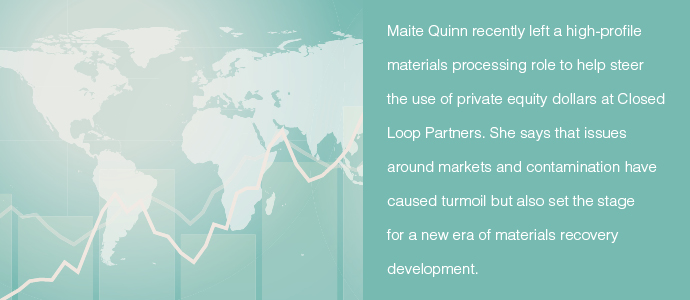
This article originally appeared in the Winter 2019 issue of Plastics Recycling Update. Subscribe today for access to all print content.
Maite Quinn, who was most recently marketing all of New York City’s curbside recyclables for Sims Municipal Recycling, has landed with a group working to boost material recovery infrastructure through investment capital.
Quinn was hired last year as a managing director at Closed Loop Partners and will work across the group’s range of initiatives. But much of her time will be geared toward the development of a new arm of the organization, a private equity vehicle called Closed Loop Leadership.
“There, we’re looking at taking major positions in companies, or acquisitions,” said Quinn, who joined Closed Loop Partners in October. The division will focus on investing in operations dealing with material science, recycling technology and more.
Quinn also holds leadership roles with the Institute of Scrap Recycling Industries’ Plastics Division and MRF Council, and she has served on the board of the Association of Plastic Recyclers. Prior to Sims Municipal Recycling, she worked for Sprint Recycling, also in New York City.
Plastics Recycling Update recently spoke with Quinn to learn more about her new position and what she brings to it after 16 years working within the recycling industry.
Plastics Recycling Update: What led you to make this move from Sims Municipal to Closed Loop Partners?
Maite Quinn: Ever since [China’s] Green Fence, a lot of investment companies have been calling [Sims Municipal Recycling]. And most of those investment companies that were calling were private equity, not really knowing anything about the industry. I’ve been hearing from a lot of other people in the industry that private equity people have been calling and trying to do acquisitions and roll-ups. And I thought, “Those companies need someone like me. I’m not a private equity person, but I’m someone who can give them a deeper knowledge of the industry.”
I started just talking to a few investment companies and seeing if there would be a place for someone like me. I got the feedback that “absolutely, yes, we need those experts that would be able to go out and source different projects.” I just started thinking about that.
I was a little afraid when I was thinking about this whole idea of going to an investment company, that I’d be joining a company where a lot of people are on the private equity side but don’t know anything about the recycling industry, and I’m going to have a lot of learning, teaching people about it. And [joining Closed Loop Partners] just felt like I can continue on the same boards I’m involved with and continue the relationships that really just feel comfortable in that space.
What are your observations on the current market troubles and markets for different materials?

Maite Quinn
Everything that’s happened recently with China and single-stream, the biggest problem has been paper – paper had the biggest impacts because of contamination. But what I’ve seen is that the finger pointing kind of went to the plastics with people saying that plastics are the problem. But the interesting thing there is that mixed paper really was the one with the biggest problem. PET still sells for $300 or $400 per ton.
I worked really hard when I was at Sims, when the Green Fence happened, to start sorting polypropylene. The [plastics Nos.] 3-7s had the biggest impact when the Green Fence happened in 2013. When we switched our optical sorters there to focus on polypropylene and we saw how much value was there, it was kind of like a light went off.
So from 2013 until I left, I helped build that part of the business at Sims, buying 3-7s. We were actually buying 3-7s and sorting them, so we essentially became similar to what QRS [in Maryland] was doing. QRS was [producing a plastic] flake, but we were sorting that material and supporting a lot of businesses in that area to not throw away the 3-7s and keep sustaining their recycling programs for municipalities.
And what I’m seeing today, more and more, is that people are targeting [plastics Nos.] 1 and 2 only. My own hometown just the other day, they were opening bids and they asked me to sit down and they said their hauler’s not going to take polypropylene anymore, only 1s and 2s, bottles. So I called up the company, saying, “No! There’s a market for this stuff!”
So the major issue you’re seeing is actually how programs are handling the supply side of things?
The biggest detriment to the industry right now is getting the supply from the curbside. Most of it is going into the landfill right now, the plastics, and when you talk to all the reclaimers, they can’t get enough. If you go to talk to the MRFs, no one’s having a problem moving their PET. Or if they’re making polypropylene, no one has a problem moving the polypropylene or the HDPE. And all of the reclaimers want more material.
That goes and feeds back to looking at the brand names, because they want more material and they’re thinking, “Where can we make these investments to get that, to get more material?” And sometimes it goes all the way back to the municipality, making sure that they sustain the collections they had.
Are you optimistic about the future of this industry despite its current challenges?
Absolutely, yes. Even though you’d think there are businesses out there thinking, “Oh, I’ve got to get out of this,” people are seeing the investment happening. Everyone knows it has to happen – they’re not just going to turn around and start throwing things into landfills. There’s such a huge opportunity for us to change the dynamics of the industry and keep things domestic. And I think that’s why you don’t see people running away from the industry. Everyone that’s still around, that survived, realizes they might have a couple years of a hard time but they know on the other side of that it’s going to be a whole different landscape.
For how many years have we been shipping our stuff over to China? And during that time we saw [domestic paper] mills closing down. But interestingly enough, we did see domestic infrastructure in the plastic industry begin. That was over the course of the past 10 years – it’s really built up. And I think in the next five years you’re going to see that on the paper side, and the mills are going to be ramping up. And you’ll see a lot more happening on the plastics side as well.
To go back to why I left Sims when I did, it was also about this opportunity and the timing of getting in on the investment side right now. Because this is the time to be on the ground floor.
You’ve been in the recycling industry a while, and you’ve seen other downturns. Do you think there’s more of an opportunity now than there was during previous periods of market strife?
Absolutely. I lived through the 2008-2009 crash, the paper crash, and what happened there was, it was also so sudden and it also felt like the sky was truly falling – Lehman Brothers had just crashed. And so everyone was freaking out, but six months later it all came back. And I think what happened here was, six months later it didn’t come back. Now people really realize that we have to do something.
Now, with it being over a year later, six months of crying flipped to people saying, “Wait, I survived, and I’m going to figure out how to survive and we’re going to build the infrastructure and we’re going to make this better.” I think that’s what people are thinking now.
Closed Loop Partners has a number of funding arms. What are they and how do they all work together to improve recycling?
We have Closed Loop Partners, and underneath that we have the Center for a Circular Economy, which is essentially an incubator for ideas. So that’s where the NextGen Cup Challenge is coming out of, where it’s like, “OK, let’s figure out how to solve for this,” bringing together all the stakeholders. [Editor’s note: The NextGen Cup Challenge was convened by Closed Loop Partners last year and is using a total of $10 million from Starbucks and McDonald’s to develop a recyclable and/or compostable solution for single-use paper and plastic foodservice cups.]
And then we have Closed Loop Ventures, which gives seed money for innovators. Let’s say a new invention comes out of the NextGen Cup Challenge. The venture fund might give that company seed money.
Then you have the Closed Loop Fund, which provides zero-interest loans for municipalities and below-market-rate loans for private companies.
Our newest vertical is the Closed Loop Leadership fund, which is private equity. And there, we’re looking at taking major positions in companies or acquisitions.
So they’re all different verticals but they all kind of feed into each other. If you look at the venture fund, you could see a company that has potential, and you could look at that business as an equity or an acquisition.
Colin Staub is the staff writer for Plastics Recycling Update and can be contacted at [email protected].

